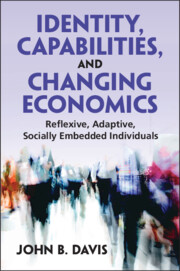
- Cited by 4
-
Cited byCrossref Citations
This Book has been cited by the following publications. This list is generated based on data provided by Crossref.
Erasmo, Valentina 2024. ‘Who are the capability theorists?’: a tale of the origins and development of the capability approach. Cambridge Journal of Economics, Vol. 48, Issue. 3, p. 425.
Hands, D. Wade 2024. On the (non) History of Preference Purification in Modern Economics. Review of the History of Economic Thought and Methodology, Vol. 1, Issue. 1,
Davis, John B 2024. Stratification economics: historical origins and theoretical foundations. Oxford Review of Economic Policy, Vol. 40, Issue. 3, p. 475.
Davis, John B. 2024. The Dynamic Temporal Sequence and Reflexive Adjustment Behavior: Foundations for a Behavioral Alternative to Optimization Theory. SSRN Electronic Journal,
- Publisher:
- Cambridge University Press
- Online publication date:
- January 2024
- Print publication year:
- 2024
- Online ISBN:
- 9781009438247


